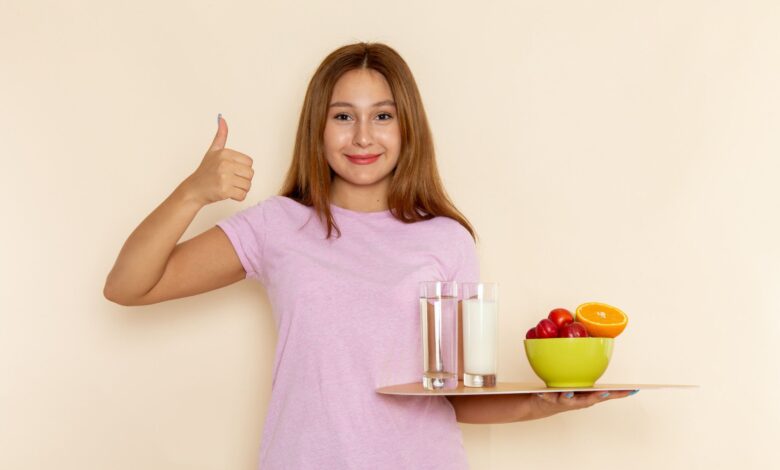What Can I Drink While Fasting (And What I Should Avoid)

Introduction: What is Intermittent Fasting, and Why Do People Follow It?
Intermittent fasting has become a popular dieting trend in recent years, with many people around the world following it for health and weight loss benefits. It is an eating pattern that alternates fasting periods of no or minimal food intake – with periods of eating normally.
For those seeking help to implement intermittent fasting, Lasta offers a fasting tracking app that provides users with automated fasting reminders, fasting progress analytics, and calorie information.
There are several fasting protocols, but most involve fasting anywhere between 8-18 hours each day by eating all of their meals within a particular time window, such as 12 pm – 8 pm. However, anyone experimenting with fasting should be careful to monitor what they eat while not fasting to make sure that they are getting enough nutrients.
Ultimately, intermittent fasting is a great way to reduce food consumption while still getting essential nutrients.
What Liquids Can You Have While Intermittent Fasting?
During intermittent fasting, it is recommended to consume water, black coffee, and other non-caloric beverages such as herbal tea. Avoid drinking liquids that contain calories, such as juice, milk, and smoothies, as they will break the fast.
Healthy Drinks To Have During Fasting Periods & How They Help
During fasting periods, some healthy drinks you can have include:
- Water. It helps to keep you hydrated and can also help to suppress appetite.
- Black Coffee. It contains caffeine which can help to boost energy levels and increase mental focus.
- Green Tea. It contains antioxidants and may help to increase fat burning.
- Bone Broth. Rich in nutrients and can help to improve gut health and digestion.
- Lemon Water. It can help to alkalize the body and improve digestion.
- Apple Cider Vinegar. It can help to regulate blood sugar levels and improve digestion.
It’s important to keep in mind that drinking calorie-containing beverages such as juice, milk, and smoothies can break the fast, so it’s best to stick with the above options while fasting.
What Beverages Should You Avoid During Your Fast?
You should avoid beverages that contain calories during your fast, as they will break the fast and may negate the benefits of intermittent fasting. Some examples of drinks to avoid during your fast include:
Juice
While freshly squeezed juice may be a healthier option than store-bought juice, it still contains a significant amount of natural sugar and calories. In addition, the process of juicing removes the fiber from the fruits and vegetables, leaving just the juice, which is high in sugar and calories and can break the fast. Therefore, it is best to consume whole fruits and vegetables instead of juice during intermittent fasting to get the most nutritional benefit.
Milk
Milk contains fat and sugar (in the form of lactose), which can break the fast; therefore, it is best to avoid milk during your fasting period. Milk is also a calorie-dense drink, which is not optimal for weight loss or other benefits associated with fasting.
For example, if you’re following a time-restricted fasting method, consuming milk during your fasting period will disrupt the process of autophagy and insulin sensitivity, which are the two main benefits associated with fasting.
Smoothies
Smoothies can be high in calories, especially if they are made with high-calorie ingredients such as sweet fruits, added sweeteners, and dairy products like milk or yogurt. These ingredients can add up quickly and can break the fast, negating the benefits of intermittent fasting.
Additionally, many store-bought smoothies are also high in added sugars and calories, making them a less healthy choice during a fasting period. If you want to consume a smoothie during your feeding window, you can use low-calorie ingredients such as leafy greens, berries, and unsweetened almond milk to keep the calorie count low.
Also, make sure you are consuming it during your feeding window and not during the fasting window.
Alcohol
Alcohol is calorie-dense, with 7 calories per gram, which is almost as calorie-dense as fat (9 calories per gram). Therefore, consuming alcohol during a fasting period can break the fast and can also interfere with the benefits of intermittent fasting, such as weight loss and improved insulin sensitivity.
Additionally, alcohol can disrupt your sleep, affect your hormones and digestion, and interfere with your body’s natural repair process. It can also dehydrate you, so it’s best to avoid alcohol while fasting.
Soft drinks or energy drinks
Soft drinks and energy drinks are high in sugar and calories, which can break the fast and negate the benefits of intermittent fasting. These drinks also often contain artificial sweeteners and chemicals that can be harmful to your health. They can also disrupt your blood sugar levels, leading to cravings and energy crashes.
It is best to avoid these drinks during your fasting period and opt for water, herbal tea, or black coffee instead.
How to Properly Hydrate & Optimize Your Intermittent
Intermittent fasting has recently gained prominence as a lifestyle choice promoted by many because of its suggested health benefits.
Proper hydration is vital for optimal health and can also help to make the fasting period more manageable. To properly hydrate and optimize any intermittent fasting, one should begin by drinking plenty of water throughout the day and between meals. It is recommended that 64 oz of water be drunk every day for proper hydration.
Here are some tips for adequately hydrating and optimizing your intermittent fasting:
- Drink enough water: Aim to drink at least 8-10 cups of water daily, and more if you are physically active or in a warm environment.
- Drink water before and after your fast: Drink a glass of water before starting your fast, and have another glass of water as soon as you break your fast.
- Drink water during your feeding window: Try to consume at least half of your daily water intake during your feeding window.
- Drink other hydrating fluids: You can also hydrate with non-caloric fluids such as herbal tea, bone broth, and lemon water.
- Monitor your urine color: A good indicator of hydration is the color of your urine, which should be pale yellow. If it’s darker, you should drink more water.
- Listen to your body: Drink water immediately if you feel thirsty or dehydrated.
It’s also important to note that proper hydration is essential for overall health, not only during fasting, so make sure to keep hydrated all the time.
In addition to drinking more water, research suggests that consuming unprocessed or minimally processed foods, such as fruits and vegetables, can further benefit your fasting practice as it aids in digestion while helping you feel full. While boosting your nutritional intake will help your overall health outcomes during intermittent fasting, exercise should also play a part.
Incorporating physical activity during non-fasting periods can not only burn calories but help to ease cravings and encourage healthier dietary choices.



